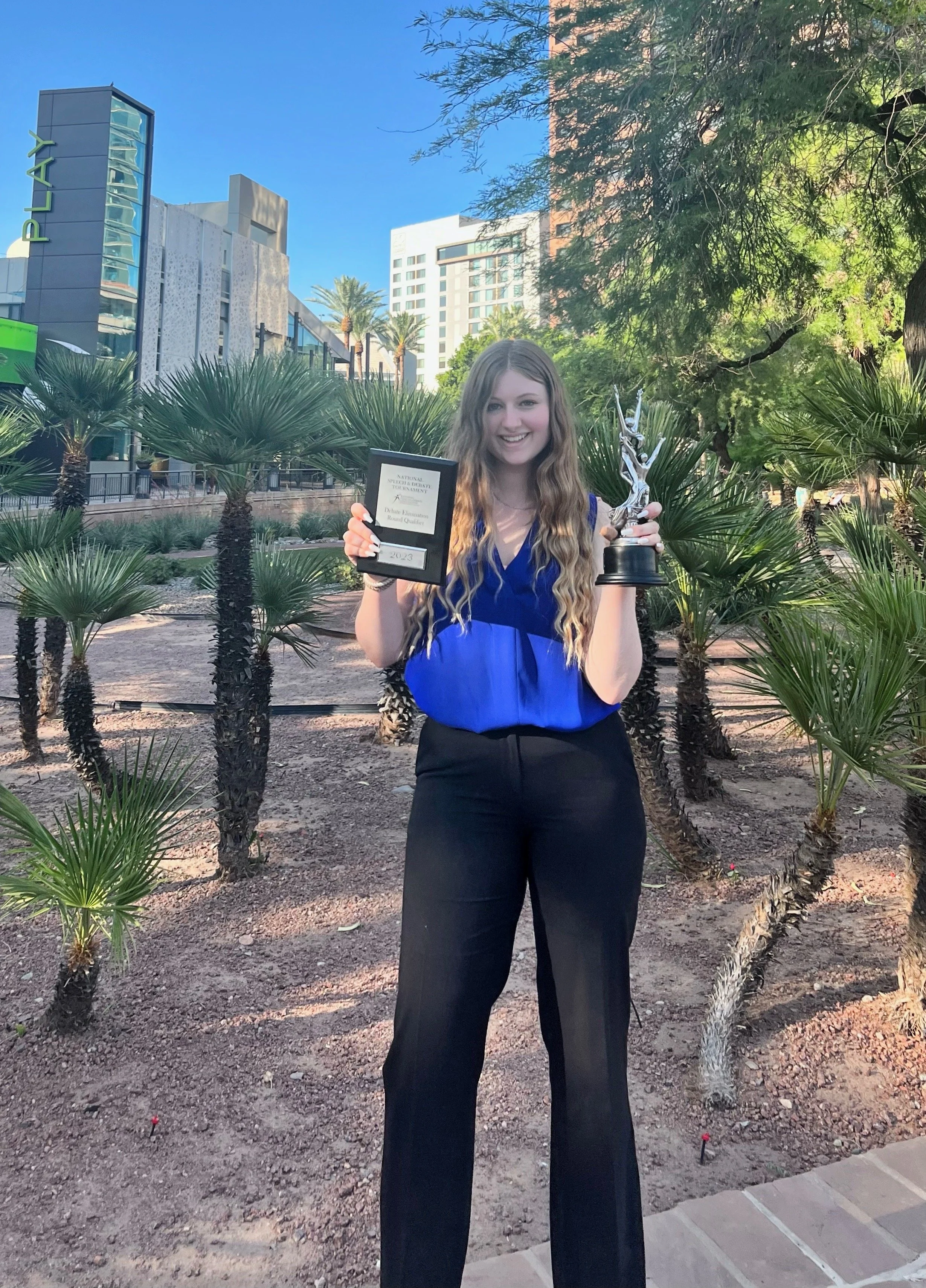Debate is not a perfect world
17-year-old student and debater Olivia Eads writes about women in competitive Speech and Debate and the impact of gender disparities in the activity. (Photo courtesy of Olivia Eads)
17-year-old student and debater Olivia Eads writes about women in competitive Speech and Debate and the impact of gender disparities in the activity.
Warning: This article contains strong language, which could be triggering to some readers.
As an incredibly unathletic child entering middle school, my options for extracurriculars were limited. Though I may have lacked the basic hand-eye coordination necessary for sports, I have always been loud, so I decided to join the debate team. But, at the very first meeting of the year, I immediately stood out. I attended a secondary school, encompassing seventh through twelfth grade, and I was the youngest on the team by far. My age presented a stark contrast to the seemingly gigantic upperclassmen in the room. I believed that I stood out because I was young — it was not until much later that I realized I was also the only girl in that room.
Being a girl in debate is a lonely experience — men dominate the competition field, the judging pool, and the coaching staff. Still, I wasn’t confronted with the true impact gender has in debate until late in freshman year. Exiting my round at a major national tournament, my opponent stopped me in the hallway to inform me that I was a “huge bitch.” I was dumbfounded. I had no idea how to react, staring back at a teenage boy who spoke in the brazen tone of someone accustomed to privilege. He continued that “the world would be better without women like” me. Who are women like me? Women who are assertive? Women who are loud? Women who win. I had won that round, so the tournament opted not to reprimand my opponent. My coaches and teammates, male and female alike, comforted me afterward. I was lucky to find refuge in my team, but the competition’s inaction still sent a clear message about the debate space at large: A woman’s feeling of safety comes second to a man’s right to express his anger. I had done everything right — I researched, I argued, I won the round. I beat him, so I was perceived as a bitch.
“Men in debate do not need to totter on stilettos across college campuses or get up early to paint their faces. But I paint my face into a smile because frowning women are not likable.”
In a perfect world, perceptions would not matter. In a perfect world, I would decide that as a feminist, I would not act any differently than my male counterparts. But debate is not a perfect world. Rather, while we advocate for real-world change in every round, we ignore such inequalities that exist within our own community. The National Speech and Debate Association (NSDA) has very few rules; there is no one criteria to be evaluated on, so debaters must adapt every round to appeal to judges. In essence, we must conform ourselves to become likable — and women have to work much harder than men to be likable. Studies have proven time and again that people are more likely to be respected if they are taller and have deeper voices — features we traditionally associate with men. So, I adapted. I learned to walk in high heels and to deepen my voice. I wear make-up because judges have told me that I otherwise appear “too harsh.” Men in debate do not need to totter on stilettos across college campuses or get up early to paint their faces. But I paint my face into a smile because frowning women are not likable.
Whether conscious or subconscious, bias exists in everyone. However, the uniquely subjective nature of debate makes it a breeding ground for bias to fester. “An Empirical Study of Gender Differences in Competitive High School Debate” found that women quit debate at comparatively far higher rates than their male peers, and they cannot be blamed for wanting to leave what is typically a very hostile environment. Even when they do everything right, women are still 17.1% less likely to win debate rounds than men. And discrimination in speech and debate is a problem that plagues not only cisgender women, but minorities at large.
Though there are many systemic flaws within debate, it is a life-changing experience. Over time, sitting in cafeterias waiting for rounds, spending late nights in hotel lobbies preparing, I was eventually able to develop true connections with other competitors. Finding my community helped me feel welcome in the activity, encouraging me to continue participating. Critically, participation in speech and debate is generally linked to long-term intrapersonal and academic skills; debaters are 70% more likely to graduate compared to their peers. They are also more likely to go to college and get an executive job after. Debate is a gateway to later success — yet if minorities don’t have a place in the activity, they cannot reap the benefits. Exclusion becomes cyclical.
“My aspirations for my own national championship suddenly seemed possible, and they did one day come true. It was the distinct success of other women in debate that inspired me, underscoring the ongoing need for representation in the NSDA.” (photo courtesy of Olivia Eads)
In order to succeed, you must first believe that success is possible. I was lucky enough to transfer to a more diverse and competitive team in the ninth grade, allowing me to see female national champions like Kaitlyn Maher and Kay Rollins for the first time. I was awestruck listening to them speak — not only were they better than anyone I’d seen before, but they were women, and they were recognized for their talent. My aspirations for my own national championship suddenly seemed possible, and they did one day come true. It was the distinct success of other women in debate that inspired me, underscoring the ongoing need for representation in the NSDA.
My six years in competitive debate were never easy, but I do believe they were worth it. Speech and debate gave me my second family, lifetime friendships, and the skills to write this article with passion. I entered my first practice as both the youngest person, and the only girl, in the room. I am no longer a girl. I was never a bitch. I am a woman.


 Read more
Read more











